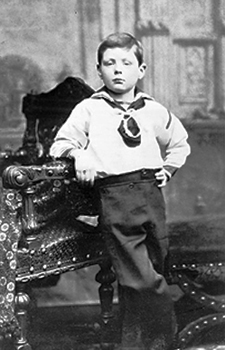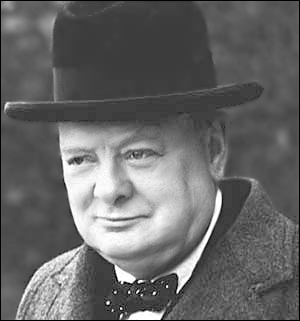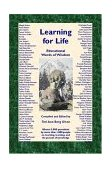

  Winston Churchill: Champion of Freedom
Sir Winston Churchill (1874-1965) was one of the most famous Englishmen of all time and one of the greatest leaders of the twentieth century. A noted statesman and orator, Winston Churchill was also a soldier, historian, writer, and artist. Churchill’s full name was Winston Leonard Spencer Churchill. His English father was Lord Randolph Churchill, a descendant of the first Duke of Marlborough. His American mother was Jeannette “Jennie” Jerome of New York City, the granddaughter of millionaire financier Leonard Jerome. However, Churchill’s parents did not have much time for him since his mother was a busy Victorian socialite and his father was involved in politics. As was the custom of the day, young Winston was raised by a nanny, Elizabeth Anne Everest, for the first eight years of his life and tutored at home by a governess until being sent away to a boarding school.
In his autobiographical work My Early Life Churchill writes:
Churchill’s parents placed their son in a fashionable and expensive boarding school, St. George’s School at Ascot. Soon he was writing letters to his mother begging her to let him come home. Disciplinary beatings were a common practice and young Winston, being stubborn and rebellious by nature, was always getting into trouble. (Virginia Cowles, Winston Churchill: the Era and the Man) Churchill later wrote in My Early Life:
Churchill became seriously ill and his parents had to take him out of school. He remained in such poor health that they left Winston in the care of their family doctor in Brighton, where he stayed for three years. During this time Churchill was taught by two sisters, the Misses Kate and Charlotte Thompson who ran the Brunswick House, a small dame school. (The Rise of the English Prep School, by Donald P. Leinster-Mackay, p. 97) In My Early Life Churchill recalls:
Churchill was later sent to the Harrow School, a prestigious boarding school for 13-18-year-old boys. However, he was considered a poor student because, “always self-willed, he would not study the classics.” (Encyclopedia Americana, 1994 ed., s.v. “Churchill, Winston,” by A.L. Rowse, All Souls College, Oxford University.) Peter de Mendelsson in The Age of Churchill wrote that Churchill simply refused to devote time to things that did not interest him. Churchill was of the opinion that it would profit him more to study his own English language rather than Latin and Greek, yet as he explains in My Early Life: Churchill’s father, upon realizing that the teenager enjoyed spending hours arranging battles of toy soldiers, had Winston transferred to the Royal Military College at Sandhurst. Churchill wasn’t able to pass the entrance examination until his third attempt, although his work improved greatly at the Military Academy. Churchill had applied for the cavalry rather than infantry training because the grade requirement was lower and did not require him to learn mathematics, which he had always disliked. But Churchill earned high marks in English and History while excelling at tactics, fortifications, fencing and horsemanship. Churchill finished near the top of his class and was commissioned a second lieutenant in the British Army, as a cavalry officer. Nevertheless, Churchill quipped, “I began my education…right after I left college.” The first thing Churchill did upon graduating was travel. He went by steamship to New York to visit his American relatives, where he wrote a letter describing American journalism as “vulgarity divested of truth.” From there he went on to Havana so that he could observe the Spanish troops putting down a rebellion. In his autobiography, Winston wrote, “When first in the dim light of early morning I saw the shores of Cuba…I felt as if I sailed with Long John Silver and first gazed on Treasure Island.” Churchill had made arrangements to send regular reports from the scene to a London newspaper. It was these writings that first brought him to the attention of the public and began his profitable side venture as a war correspondent. In Cuba, Churchill developed two habits that would last the rest of his life: smoking cigars and taking siestas. Once back in England, Churchill was sent to India where he served a dual role as both a soldier and a reporter. However, he found that a young officer’s life in India was leisurely and rather boring. Churchill took this opportunity to educate himself by reading many volumes of history and economics, as well as studying the parliamentary debates of the 1870’s to 1890’s. “Here, besides his addiction to polo, he went on seriously with his education, which in his case was very much self-education. His mother sent out to him boxes of books, and Churchill absorbed the whole of Gibbon and Macaulay, and much of Darwin. The influence of the historians is to be observed all through his writings and in his way of looking at things.” (Encyclopedia Americana, 1994 ed., s.v. “Churchill, Winston,” by A.L. Rowse, All Souls College, Oxford University.) Although Churchill’s mother had played a limited role in Winston’s upbringing, after his father died she started taking a more active interest in her son as a young adult. Now Winston was finally able to say, “You have omitted to mention the greatest of my teachers—my mother.” Churchill did not want to follow a conventional career of promotion through the army ranks, but was mainly interested in seeking involvement in active military campaigns and later going into politics. His mother’s contacts among high society figures were invaluable to him. Churchill managed to get out of India by joining a military expedition to Egypt, where he ended up in the middle of action in the Sudan and took part in the last British cavalry charge in history. Next, while working as a correspondent during the Boer War in South Africa, Churchill was captured. He was held prisoner for one month before making a daring escape across 300 miles of hostile territory without a map and no knowledge of the language. Churchill’s widely publicized account of his adventure made him a national celebrity and he was elected to Parliament the following year. For a time he also served on the front lines during the First World War when he was put in charge of the Royal Navy. Long before World War II began, Churchill had been warning about the dangers of Hitler’s growing power but no one would listen. By the time Churchill became Prime Minister in 1940, England was already at war with Germany. While he was growing up, Churchill had a speech impediment and spoke with a lisp. He consistently worked to overcome this and after many years declared, “My impediment is no hindrance.” As a result, he became one of the world’s great orators. Steadfast determination and confidence rang out in every speech Churchill made. In one of his most famous speeches, Prime Minister Churchill rallied his countrymen saying “…we shall fight on the beaches, we shall fight on the landing grounds, we shall fight in the fields and in the streets, we shall fight in the hills; we shall never surrender…” Even though large parts of Europe had already fallen under Nazi rule and the British people were enduring terrible bombings, they continued to fight back because Churchill’s inspiring leadership gave them the will to carry on. Churchill served as British Prime Minister from 1940-1945 and again from 1951-1954. Churchill was an eloquent and witty master of the English language whether speaking or writing. His periods out of office gave Churchill an opportunity to cultivate his talents in biography and contemporary history, for which he had a lively style and a wide audience. Writing books eventually became Churchill’s second profession, of which his many works include: a four-volume biography entitled Marlborough, a two-volume biography of his father, Lord Randolph Churchill; the four-volume History of the English-Speaking Peoples; his personal memoir My Early Life, the story of his first 30 years (1874-1904); The World Crisis, a five-volume history of the First World War; and The Second World War, a highly detailed six-volume readable narrative for which he won the Nobel Prize for Literature in 1953. That same year he was knighted and became known as Sir Winston Churchill. In addition to being a writer and orator, Churchill was also an artist. He took up painting as a pastime during World War II and it became a passion in the second half of his life. Churchill had never even taken a drawing class, but taught himself how to paint by copying other people’s paintings. He said, “There is no better exercise than to study and devour a picture, and then, without looking at it again, to attempt the next day to reproduce it.” Churchill wrote an essay, “Painting as a Pastime,” in which he tells of the benefits and joys of his forty-year hobby, particularly as a relaxation of the mind for those who bear heavy responsibilities over a prolonged period of time. In fact, he is quoted as saying: “If it weren’t for painting, I couldn’t live; I couldn’t bear the strain of things.” Most of Churchill’s artistic works, which number over 500, are colorful impressionistic landscapes or bright floral still lifes. He also did the occasional portrait such as one of his wife, Clementine. Despite his late start and lack of formal training, Churchill’s artwork – which he entered in shows anonymously – was highly acclaimed. By his courageous leadership, Churchill may have contributed more than anyone else to winning World War II. In 1963, by an unprecedented act of the U.S. Congress, Churchill was made an honorary American citizen. When Churchill died at the age of 90, he was given a hero’s funeral which was attended by the largest number of statesmen and dignitaries ever assembled from around the world. Did You Know…? The old mining town of Jerome, Arizona has a distant connection to Winston Churchill. A New York investor, Eugene Jerome, financed the copper mine there and the town was named after him. Eugene Jerome was a nephew of Leonard Jerome, Jennie Jerome’s father. This made him a cousin of Jennie Jerome, who was Winston Churchill’s mother.
Winston Churchill: Soldier, Statesman, Artist
Sir Winston Churchill: His Life and His Paintings
Contact: . Thanks! Please click here for reprint permission.


These pages are a continuous work in progress.
|
Help Support this Site
and purchase items via our affiliate links. Thank you!
 
Thank you for visiting my |

